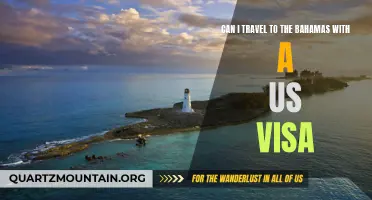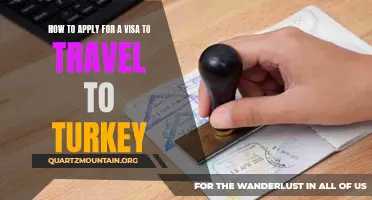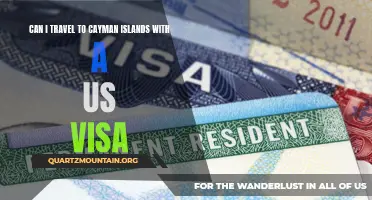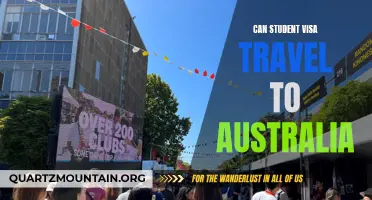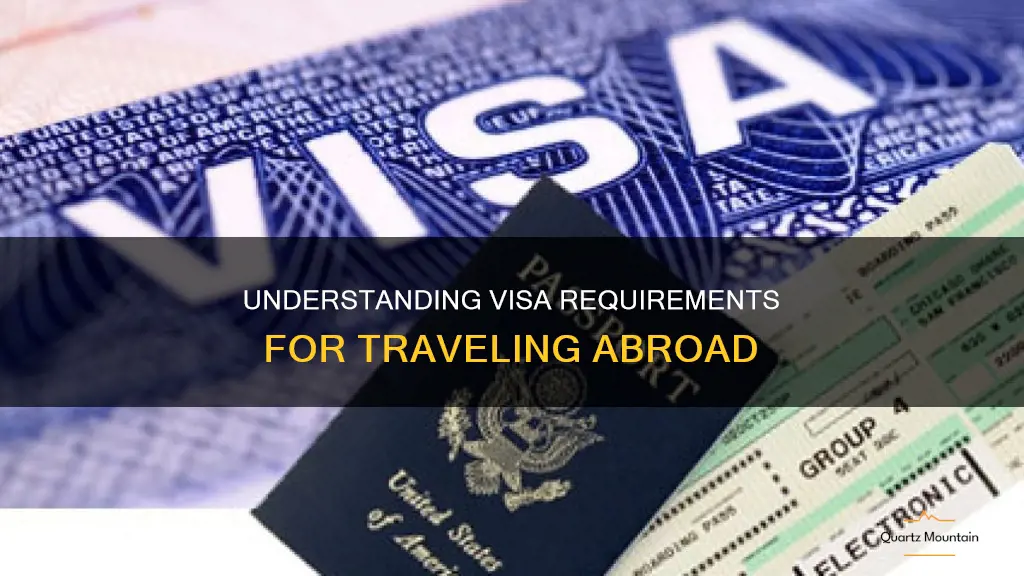
Traveling abroad can be an incredibly enriching experience, allowing us to immerse ourselves in new cultures, try new foods, and explore some of the most beautiful places in the world. However, before jetting off to our dream destinations, it's essential to understand the visa requirements for the country we plan to visit. Visa requirements can vary significantly from country to country, and understanding the process and necessary documentation can save us from unnecessary stress and unexpected obstacles during our travels. In this article, we will delve into the importance of understanding visa requirements for traveling abroad and discuss some essential tips to help make the process smoother and more manageable. So, if you're planning your next international adventure, keep reading to ensure you're well-prepared and ready to embark on your journey hassle-free.
What You'll Learn

Visa-Free Travel:

Exploring the World without Borders
In an era of globalization, the idea of travel has become more accessible and appealing than ever before. With the advent of visa-free travel opportunities, individuals can visit various countries without the need for a visa, making it easier for travelers to explore the world, experience new cultures, and create lifelong memories. In this blog post, we will unravel the concept of visa-free travel, discussing the eligible countries, duration of stay, as well as the restrictions and conditions associated with this thrilling opportunity.
Eligible Countries for Visa-Free Travel:
Before embarking on your dream adventure, it is crucial to determine the countries that allow visa-free travel. Many nations have established bilateral agreements or reciprocal visa-waiver programs to facilitate international tourism and business. It is generally advisable to consult the consulate or embassy of your destination country to verify whether your nationality is eligible for visa-free travel. Some popular destinations that allow visa-free access for certain nationalities include:
- Schengen Area: Comprising 26 European countries, this region allows visa-free travel for citizens of many countries, including the United States, Canada, Australia, New Zealand, and numerous European nations.
- Southeast Asia: The Association of Southeast Asian Nations (ASEAN) member countries, such as Thailand, Malaysia, and Singapore, offer visa-free access to citizens of several countries, promoting tourism in the region.
- Caribbean Islands: Paradise destinations like the Bahamas, Barbados, and the Dominican Republic provide visa-free entry for travelers from a range of countries.
Duration of Stay for Visa-Free Travel:
When planning a trip, it is essential to be aware of the duration of stay permitted under visa-free travel arrangements. Each country has its own requirements, ranging from a few days to several months. Generally, the duration of stay tends to vary based on the purpose of travel, such as tourism, business, or transit. To avoid any legal complications, make sure to familiarize yourself with the specific requirements of your destination country. If you plan to extend your stay beyond the permitted duration, you may need to obtain a visa or apply for an extension before your arrival.
Restrictions and Conditions for Visa-Free Travel:
Although visa-free travel provides incredible opportunities for adventure, it is essential to abide by the restrictions and conditions set by each country. Failure to comply with these regulations can result in fines, deportation, or even bans on future entry. While the specific restrictions and conditions vary, some common rules include:
- No Employment: Visa-free travel generally prohibits engaging in any form of employment or paid activities. This condition is in place to protect the labor market of the host country and prioritize opportunities for its citizens.
- Proof of Sufficient Funds: Many countries require travelers to provide evidence of sufficient funds to cover their stay, accommodation, and other expenses. This requirement ensures that visitors can sustain themselves during their time in the country.
- Return/Onward Ticket: Some countries may ask for proof of a return or onward ticket to ensure that travelers do not overstay their permitted duration or intend to settle illegally.
- Good Conduct: Visitors are expected to behave responsibly and respect the laws and customs of the host country. Engaging in illegal activities or violating local norms can lead to serious consequences.
Visa-free travel has undoubtedly revolutionized the way we explore the world, offering countless opportunities to experience different cultures, indulge in new cuisines, and create unforgettable memories. By understanding the eligible countries, duration of stay, and restrictions associated with visa-free travel, you can ensure a smooth and hassle-free experience while embarking on your dream journey. Remember to research the requirements of your destination country thoroughly and comply with all applicable regulations. Bon voyage!
Can You Travel to the Dominican Republic with an F Visa?
You may want to see also

Visa on Arrival:
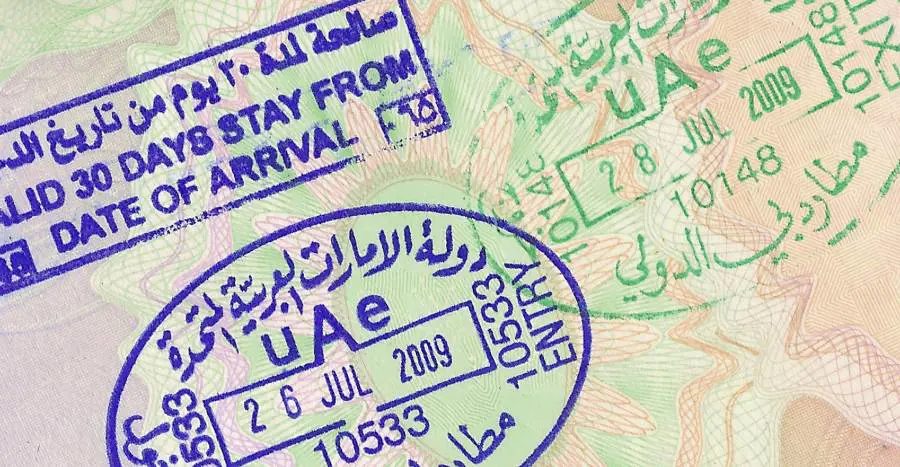
Travelers around the world often face challenges when it comes to obtaining the necessary visas before visiting a foreign country. However, in an effort to boost tourism and facilitate travel, many countries now offer visa on arrival options. With this convenient arrangement, eligible visitors can obtain their visas directly at the destination airport or border crossing. In this article, we will explore the concept of visa on arrival, the eligible countries, requirements and steps involved, as well as the duration and conditions for obtaining this type of visa.
Eligible Countries for Visa on Arrival:
The visa on arrival option is available for citizens of specific countries, and the list varies from one country to another. It is essential for travelers to verify their eligibility for visa on arrival before making their travel plans. To find out if your country is on the list of eligible countries, check the official website or contact the consulate or embassy of the destination country. Many popular tourist destinations now offer visa on arrival, including Thailand, Indonesia, Malaysia, Nepal, and Jordan, among others.
Requirements and Process for Visa on Arrival:
To obtain a visa on arrival, travelers need to fulfill certain requirements and follow the appropriate procedures. While the specifics may vary depending on the destination, there are some common requirements for visa on arrival:
A) Valid Passport: Travelers should ensure that their passport is valid for at least six months beyond the date of entry.
B) Return or Onward Ticket: Most countries require travelers to show proof of onward or return journey within a specified time frame.
C) Sufficient Funds: Visitors may be required to prove that they have adequate financial means to support their stay during the visa duration.
D) Visa Fee: There is usually a fee associated with the visa on arrival, which can vary depending on the destination country.
The actual process of obtaining a visa on arrival generally involves the following steps:
- Arriving at the designated port of entry
- Completing the required visa application form (available at the airport or border crossing)
- Presenting the necessary documents, including passport and supporting documents, as mentioned above
- Paying the visa fee
- Waiting for the visa to be processed and issued
- Duration and Conditions of Visa on Arrival:
The duration and conditions of a visa on arrival also differ from country to country. Typically, visa on arrival allows visitors to stay for a specific period, usually ranging from 15 to 30 days. However, some countries may offer longer durations or multiple entry visas. It is crucial to check the visa conditions and ensure compliance to avoid any overstays or legal issues.
Travelers must also note that a visa on arrival does not guarantee entry into the country. Immigration authorities at the port of entry have the final discretion to grant or deny entry based on their assessment of the traveler's purpose of visit, duration of stay, and other factors. It is essential to abide by the laws and regulations of the destination country to ensure a smooth and hassle-free travel experience.
Visa on arrival options provide a convenient and accessible way for international travelers to explore new countries without the need to obtain a visa prior to departure. By familiarizing yourself with the eligible countries, requirements, and process outlined above, you can navigate the visa on arrival process confidently and ensure a seamless start to your journey. Remember to check the official sources for the most up-to-date information and plan your trip accordingly to make the most of this travel facilitation measure.
Can U Visa Holders Travel Abroad? Important Information You Should Know
You may want to see also

Visa Requirements:
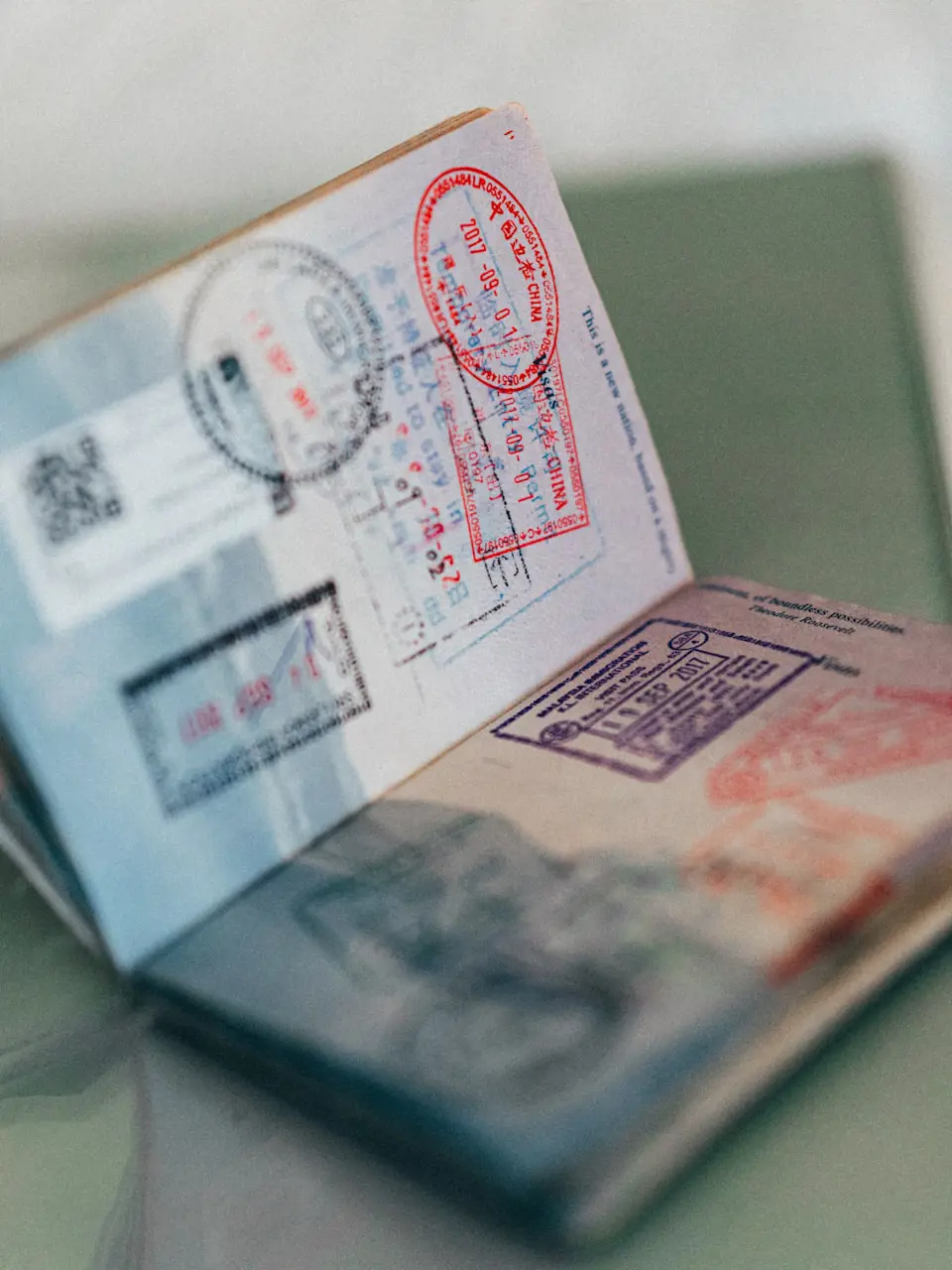
Different Types of Visas:
When planning to visit another country, one of the most important aspects to consider is checking the visa requirements. Visa requirements can vary depending on the purpose of your visit, the duration of your stay, and the country you are planning to visit. Understanding the different types of visas available can help you determine which one is applicable to your travel plans.
- Tourist Visa: A tourist visa is issued for people who are traveling for leisure or recreational purposes, such as sightseeing, visiting friends or relatives, or attending cultural events. This type of visa usually has a relatively short validity period.
- Business Visa: A business visa is intended for individuals who are traveling for business-related purposes, such as attending meetings, conferences, or exploring potential business opportunities. It normally requires an invitation letter from a company or organization in the destination country.
- Student Visa: Students planning to study abroad need to apply for a student visa. This type of visa is granted to those who have been accepted into an educational institution and are pursuing a full-time academic program.
- Work Visa: If you are planning to work in a foreign country, you will typically need to obtain a work visa. Work visas are usually granted to individuals who have a job offer from a company in the destination country and meet certain eligibility criteria.
Visa Application Process:
Once you have determined the type of visa required for your travel plans, you need to follow the visa application process. This process may vary from one country to another, but here are some general steps to help guide you:
- Research: Begin by researching the visa requirements for the country you plan to visit. Visit the official website of the embassy or consulate of that country to gather information on the application process.
- Fill out the application form: Fill out the visa application form accurately and make sure to provide all required information. Double-check the form to avoid any errors or missing details.
- Gather required documents: Prepare the necessary documents as per the visa requirements. This may include your passport, passport-sized photographs, invitation letters, bank statements, travel itinerary, and any other supporting documents requested.
- Schedule an appointment: Some countries require you to schedule an appointment to submit your visa application. Ensure that you schedule the appointment well in advance, as there may be a limited number of slots available.
- Submitting the application: On the day of your appointment, submit your visa application along with the required documents. Make sure you have all the necessary documents in the correct format and order.
- Pay the visa fee: Many visa applications require a processing fee. Pay the fee at the designated payment counter or online, depending on the process outlined by the embassy or consulate.
- Track your application: After submitting your visa application, you can usually track its progress online. This will provide you with an estimate of the processing time for your visa.
Required Documents for Visa Application:
The documents needed for a visa application can vary depending on the type of visa and the country you are applying to. While specific requirements may vary, here are some common documents you may need:
- Valid passport: Your passport should have a minimum of six months' validity from the date of application and blank visa pages.
- Visa application form: Fill out the visa application form accurately and completely. Make sure to sign it where required.
- Passport-sized photographs: Provide recent, colored, and passport-sized photographs as per the specifications outlined by the embassy or consulate.
- Proof of financial standing: This may include bank statements, proof of employment or business ownership, or any other document indicating your financial stability.
- Letter of invitation: If you are traveling for business, you may need an invitation letter from a company or organization in the destination country.
- Travel itinerary: Provide the details of your travel plans, including flight bookings, hotel reservations, and any planned activities during your stay.
Processing Time and Fees for Visa Application:
The processing time and fees for visa applications can vary depending on the country you are applying to and the type of visa you require. It is important to check the official website of the embassy or consulate for the most up-to-date information. However, some general points to keep in mind are:
- Processing time: Visa processing time can range from a few days to several weeks. It is recommended to apply well in advance to allow for any unexpected delays.
- Visa fees: Visa fees are usually non-refundable, even if your application is rejected. The fee can vary based on the type of visa and the country's policies. Make sure to check the payment method accepted by the embassy or consulate.
- Additional fees: Some countries may require additional fees for services such as expedited processing or visa pickup through a courier service. These fees are usually optional and depend on your preferences and needs.
Remember to plan your trip well in advance to allow ample time for the visa application process. It is also important to carefully review and follow all instructions provided by the embassy or consulate. Failure to provide the necessary documents or meet the requirements can result in delays or denial of your visa application. Be sure to double-check all information submitted and maintain open communication with the embassy or consulate throughout the process.
Can I Travel While My Visa is Being Processed in Germany?
You may want to see also

Special Cases:
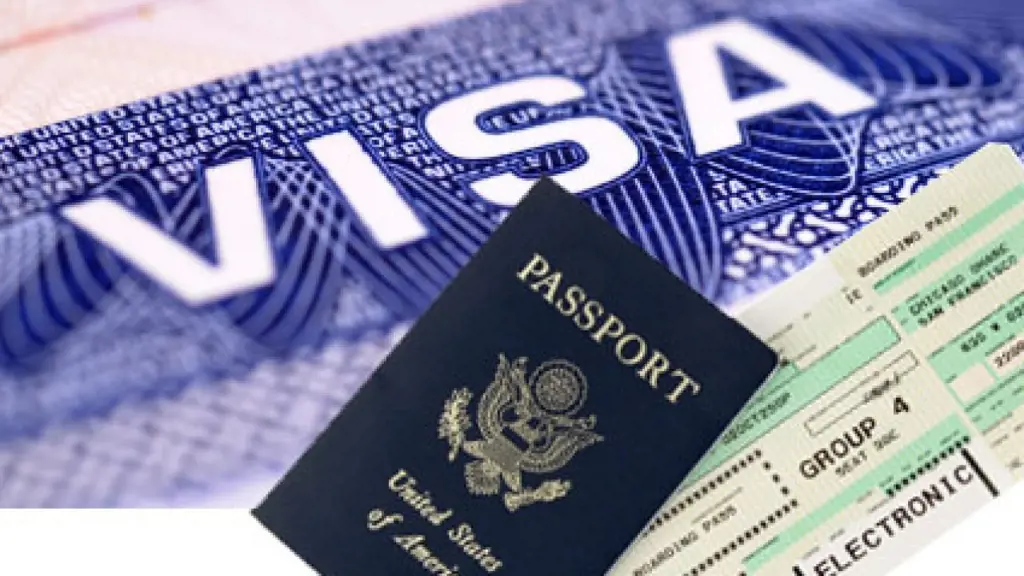
When it comes to traveling to a foreign country, transit visas often become a requirement, especially if you are not a citizen of that country. A transit visa allows you to pass through a country on your way to another destination. If you are planning a layover in a country before continuing your journey, it is important to understand the transit visa requirements for that specific country.
Transit visas are typically required if you have a layover that is longer than a few hours or if you plan to leave the airport during your layover. In some cases, you may be required to obtain a transit visa even if you plan to stay within the airport grounds. It is important to check the specific requirements of the country you will be transiting through to avoid any last-minute issues or complications.
To apply for a transit visa, you will generally need to provide certain documents such as your passport, flight itinerary, and a valid visa for your final destination. Some countries may also require additional documentation such as proof of funds to support your transit stay or a return ticket to your home country. Each country has its own specific requirements, so it is crucial to research and understand the transit visa regulations well in advance of your trip.
Working Visas
If you are planning to work in a foreign country, you will likely need to obtain a working visa before you can legally work there. Working visas vary from country to country, and each has its own set of requirements and application process. It is important to thoroughly research the specific working visa regulations for the country where you plan to work.
The requirements for a working visa usually include a job offer or sponsorship from an employer in the country, a valid passport, and proof of qualifications or experience in the relevant field. Some countries may also require you to provide additional documents such as a criminal background check or medical examination.
Once you have gathered all the necessary documents, you will need to submit your application for a working visa. The application process may involve filling out forms, paying fees, and attending an interview or providing additional supporting documents. It is important to carefully follow the application instructions provided by the embassy or consulate of the country where you plan to work.
Student Visas
If you are planning to study abroad, you will need to obtain a student visa to legally study in a foreign country. Student visa requirements vary from country to country, so it is important to research the specific regulations for your desired study destination.
To apply for a student visa, you will usually need to provide documents such as a valid passport, acceptance letter from a recognized educational institution, proof of financial support, and a completed application form. Some countries may also require additional documents such as medical certificates or proof of language proficiency.
Once you have gathered all the necessary documents, you will need to submit your student visa application to the embassy or consulate of the country where you plan to study. The application process may involve paying fees, attending an interview, or providing additional supporting documents. It is important to carefully follow the application instructions and meet the deadlines provided by the relevant embassy or consulate.
Medical Tourism Visas
Medical tourism has become a popular option for individuals seeking specialized medical treatments or procedures abroad. If you are planning to travel to another country for medical purposes, you may need to obtain a medical tourism visa to ensure a smooth and legal visit.
Medical tourism visas are typically required if you are planning to stay in a foreign country for an extended period of time for medical treatment or if you require medical attention beyond the scope of a regular tourist visa. The specific requirements for a medical tourism visa may vary depending on the country you plan to visit.
To apply for a medical tourism visa, you will generally need to provide documents such as a valid passport, medical treatment plan from a recognized medical provider, proof of financial capability to cover medical expenses, and a letter of invitation or sponsorship if applicable. Some countries may also require additional documentation such as a medical certificate or proof of health insurance.
Once you have gathered all the necessary documents, you will need to submit your medical tourism visa application to the embassy or consulate of the country where you plan to receive medical treatment. The application process may involve filling out forms, paying fees, and providing additional supporting documents. It is important to carefully follow the instructions provided by the embassy or consulate to ensure a successful visa application.
In conclusion, special cases such as transit visas, working visas, student visas, and medical tourism visas require careful planning and attention to detail. Each type of visa has its own specific requirements, and it is important to thoroughly research and understand the regulations for the country where you plan to travel. By gathering all the necessary documents and following the application instructions provided by the relevant embassy or consulate, you can ensure a smooth and legal journey to your destination.
Exploring the Boundless Opportunities: Traveling to China Anytime with a 10-Year Visa
You may want to see also
Frequently asked questions
Whether or not you need a visa to travel to other countries depends on your nationality and the destination country. Some countries have visa-free agreements with certain countries, allowing their citizens to visit without a visa for a certain period of time. However, many countries do require visitors to obtain a visa before entering. It is best to check with the embassy or consulate of the country you plan to visit to determine if you need a visa.
To find out if you need a visa to travel to a specific country, you can check the website of the embassy or consulate of that country. They will usually have information regarding visa requirements for different nationalities. Another option is to use a visa information website or a travel agency that specializes in visa services. These resources can provide you with up-to-date visa requirements for various countries, making it easier for you to determine if you need a visa to travel.
The time it takes to obtain a visa for travel can vary greatly depending on the country you are applying to, the type of visa you need, and the processing times of the embassy or consulate. It is best to apply for your visa well in advance of your intended travel dates, as the application and approval process can sometimes take several weeks or even months. It is recommended to check the estimated processing times provided by the embassy or consulate and plan accordingly to avoid any delays in your travel plans.


